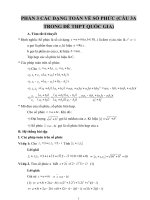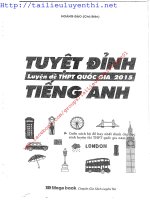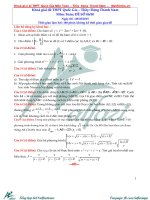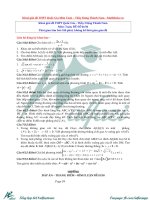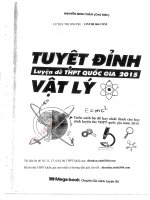DE THPT QUOC GIA 382
Bạn đang xem bản rút gọn của tài liệu. Xem và tải ngay bản đầy đủ của tài liệu tại đây (130.98 KB, 5 trang )
<span class='text_page_counter'>(1)</span>SỞ GD- ĐT VĨNH PHÚC TRƯỜNG THPT LIỄN SƠN ĐỀ CHÍNH THỨC. ĐỀ THI THPT QUỐC GIA NĂM 2015 MÔN THI: TIẾNG ANH Thời gian: 90 phút. PHẦN TRẮC NGHIỆM: (8 điểm). I. Choose the best answer to complete the sentence. 1. Despite playing under strength, the village team _____ beat the rivals. a. could b. were able to c. couldn’t d. weren’t able to 2. I suggest Andrea ______ in touch with the organisers. a. should get b. to get c. getting d. gets 3. The traffic lights _____ green and I pulled away. a. became b. turned c. got d. went 4. ______ during the storm. a. They were collapsed b. The fence was collapsed c. They collapsed the fence d. The fence collapsed 5. The suspect confessed _______. a. his crime b. the police his crime c. his crime to the police d. his crime the police 6. ______ thinks that Judith should be given the job. a. Neither of us b. The majority of my colleagues c. Practically everyone d. A number of people 7. We had ______ holiday in Spain. a. a two week’s b. two weeks c. two-week d. a two-week 8. The company owns _____ in the city centre. a. a cars park b. several car parks c. a car park d. several cars parks 9. The government has introduced _______. a. a children’s clothes tax b. a tax on children clothes c. a children clothes tax d. a tax on children’s clothes 10. I’ll be with you in _______. a. one quarter of an hour b. a quarter of an hour c. a quarter of one hour d. a quarter of hour 11. _____ my friends knew I was getting married. a. Not much of b. not many of c. Not much d. Not many 12. ____ the children _____ awake. a. None of…was b. Not any of…werec. No …. was d. None of…were 13. The party was excellent, and I’d like to thank all the ______. a. concerned people b. responsible people c. people that concerned d. people concerned 14. I asked Francis to clean the car, and he did ______. a. a well job b. the job good c. a good job d. a job well 15. ______, they slept soundly. a. Hot though was the night air b. Hot though the night air was c. Hot the night air as was d. Hot although the night air was 16. John was the first person I saw _____ hospital. a. by leaving b. on leaving c. in leaving d. on to leave 17. He suddenly saw Sue ____ the room. He pushed his way ____ the crowd of people to get to her. a. across…through b. over…through c. across…across d. over…along 18. She tried to _______. a. talk me the plan out of b. talk out of me the plan c. talk me out of the plan d. talk out me of the plan. 19. _____ that Marie was able to retire at the age of 50. a. So successful her business was, b. So successful was her business,.
<span class='text_page_counter'>(2)</span> c. Her business was successful d. So was her successful business, 20. I’m _____ a complete loss to understand why you reacted so violently. a. at b. in c. on d. by 21. From an early age, Wolfgang had a(n) ____ for music. a. interest b. passion c. involvement d. tendency 22. Financial help from his parents ______ James to complete his studies. a. granted b. provided c. eased d. enabled 23. I don’t take ____ to being disobeyed. That’s a warning! a. well b. kindly c. gently d. nicely 24. I like that photo very much. Could you make an _____ for me? a. increase b. enlargement c. extension d. expansion 25. I’m becoming increasingly _____ . Last week, I locked myself out of the house twice. a. oblivious b. mindless c. absent d. forgetful II. Pick out the word whose underlined part is pronounced differently from that of the others. 26. a. south b. southern c. scout d. drought 27. a. dome b. comb c. home d. tomb III. Pick out the word whose stressed syllable is different from that of the others. 28. a. literature b. preventive c. measurement d. temperature 29. a. example b. continue c. sensible d. contestant 30. a. constant b. magnetic c. sensitive d. atmosphere IV. Choose the best answer. 31. Would you like some more tea? - _______________________ a. No, thank. b. Yes , thanks. c. Yes, please. d. No, please. 32.Will it rain on the day of our departure? - _____________________ a. I hope not. b. I don’t hope so c. I hope not so. d. I hope it wouldn’t. 33. -Remember to return the newspaper to my father. - _______________________ a. I will b. Why not c. I won’t d. Of course. 34.Will you have time to help us? - ______________________ I’m very busy at the moment. a. I’m afraid not b. I think so. c. I don’t expect so. d. I hope not. 35. “I’d like the blue jacket, pleases! Can I try it on?” – Yes, _______________ “ a. you would b. you must c. certainly d. you do V. Read the passage and the questions or unfinished sentences, then choose the best answer for each. A solar eclipse occurs when the Moon moves in front of the Sun and hides at least some part of the Sun from the earth. In a partial eclipse, the Moon covers part of the Sun; in an annual eclipse, the Moon covers the center of the Sun, leaving a bright ring of light around the Moon; in a total eclipse, the Sun is completely covered by the Moon. It seems rather improbable that a celestial body size of the Moon could completely block out the tremendously immense Sun, as happens during a total eclipse, but this is exactly what happens. Although the Moon is considerably smaller in size than the Sun, the Moon is able to cover the Sun because of their relative distances from Earth. A total eclipse can last up to 7 minutes, during which time the Moon’s shadow moves across Earth at a rate of about 6 kilometers per second. 36. This passage mainly _________. a. describes how long an eclipse will last. B. gives facts about the Moon. c. explains how the Sun is able to obscure the Moon. D. informs the reader about solar eclipses. 37. In which type of eclipse is the Sun obscured in its entirety? a. A partial eclipse b. An annual eclipse c. A total eclipse d. A celestial eclipse.
<span class='text_page_counter'>(3)</span> 38. The word ring in line 3 could be best replaced by ______. a. piece of gold b. circle c. jewel d. bell 39. A celestial body in line 5 is most probably one that is found ______. a. somewhere in the sky b. within the Moon’s shadow c. on the surface of the Sun d. inside Earth’s atmosphere 40. What is the meaning of block out in line 5? a. Square b. Cover c. Evaporate d. Shrink 41. According to the passage, how can the Moon hide the Sun during a total eclipse? a. The fact that the Moon is closer to Earth than the Sun makes up for the Moon’s smaller size. b. The Moon can only obscure the Sun because of the Moon’s great distance from the Earth. c. Because the Sun is relatively close to Earth, the Sun can be eclipsed by the Moon. d. The moon hides the Sun because of the Moon’s considerable size. 42. The word relative in line 8 could best be replaced by ________. a. familial b. infinite c. comparative d. paternal 43. The passage states that which of the following happens during an eclipse? a. The Moon hides from the Sun. b. The Moon is obscured by the Sun. c. The Moon begins moving at a speed of 6 kilometers per second. d.The Moon’s shadow crosses Earth 44. The word rate in line 9 is closest in meaning to ______. a. form b. speed c. distance d. rotation 45. Where is the passage does the author mention the rate of a total eclipse? a. Lines 1- 2 b. Lines 2- 4 c. Lines 5-6 d. Lines 8-9 VI. Read the text below and choose the word that best fits the space. EXAM ADVICE In Part Three of the Speaking Section you work with a partner. You have to do a (46) ____ task which usually ( 47)_____ about 3 minutes. One possible task is “ problem (48) ____”, which means you have to look at some (49) ____ information and then (50) ____ the problem with your partner. You maybe show photos, drawings, diagrams, maps, plans, advertisements or computer graphics and it is (51)_____ that you study them carefully. If necessary, check you know exactly what to do by (52)_____ asking the examiner to (53)____ the instructions or make them clearer. While you are doing the task, the examiner will probably say very (54)_____ and you should ask your partner questions and make (55)_____ if he or she is not saying much. If either of you have any real difficulties the examiner may decide to step in and ( 56) _____ . Normally, however, you will find plenty to say, which helps the (57)_____ to give you a fair mark. This mark depends on your success in doing the task by (58) _____ with your partner, which includes taking (59)_____ in giving opinions and replying appropriately, although in the end it may be possible to “ agree to (60) _____”. 46. a. single b. lonely c. unique d. once 47. a. exists b. lasts c. stays d. maintains 48. a. solving b. working c. making d. finding 49. a. optical b. obvious c. noticeable d. visual 50. a. argue b. discuss c. talk d. have 51. a. essential b. needed c. helpful d. successful 52. a. formally b. officially c. politely d. sincerely 53. a. insist b. copy c. tell d. repeat 54. a. little b. much c. few d. many 55. a. ideas b. statements c. speeches d. suggestions 56. a. complain b. help c. suggest d. fail 57. a. judge b. referee c. assessor d. observer 58. a. competing b. struggling c. opposing d. co-operating 59. a. changes b. sides c. turns d. sentences 60. a. contrast b. disagree c. argue d. object.
<span class='text_page_counter'>(4)</span> VII. Find the underlined part that needs correcting. 61. The first (A) national park in world (B), Yellowstone National Park, was (C)established in (D)1872. 62. Animation is a technique (A) for creativity (B) the illusion of life(C) in inanimate things.(D) 63. Scientists at universities (A) are often more involved (B) in theoretical research than(C) in practically(D) research . 64. Benjamin Franklin’s ability (A) to learn from observation and experience contributed greatly(B) to him(C) success in(D) public life. PHẦN TỰ LUẬN: (2 điểm) I. Rewrite the following sentences using the words given so that it means exactly the same as the first sentence. 1. Could you give me some advice? (like) I _________________________________________ 2. “Please don’t smoke in the house.” she said to us. (to) She _________________________________________ 3. “Why didn’t you mention the problem before?” I asked them. (had) I asked them _________________________________________ 4. You are unfit because you don’t do enough exercise. (would) If _________________________________________ 5. I bought myself some good new clothes. I need them for my new job. ( which) I bought _________________________________________ II. Topic: Is a child better brought up in the countryside or in the city? There are advantages and disadvantages to a childhood in either the country or a city. It's hard to say which is better. Growing up in the country means a certain amount of isolation. You're in a small town or on a farm and not with a lot of people. Even more important, the people you meet every day tend to be just like you. Most will be the same race as you, have the same background as you, and will have gone to the same schools as you. In the city, the people you meet are all different. There are different races and different cultures. You get a more interesting mix. City people tend to come from a lot of different places and move around a lot. So, there isn't the sense of community in the city that you have in the country. People in the city can live in the same apartment building for twenty years and never get to know their neighbors. In the country, everybody knows everybody. For a child, this means the country is more secure. A child can get lost or hurt in the city and have no one to turn to. In the country, everyone's a neighbor. People in the country feel connected to each other. A child growing up in the city has the advantage of a lot of interesting and exciting places to visit. He or she can go to the zoo, museums, art galleries and concerts. There are a lot of restaurants with different kinds of food. It's easy to see every new movie that comes out. Children in the country don't have a lot of these activities nearby. All in all, I think a childhood in the city is better because it prepares you more for what real life is like.. KEY TO PRACTICE TEST 18. 1B. 2A. 17 A 33 D 49. 18 C 34 A 50. 3B(D 4B ) 19B 20 A 35C 36 D 51A 52. 5A( C) 21B 37C 53D. 6A(C 7D ) 22D 23 B 38B 39 A 54A 55. 8B(C). D. 24B. 25 D 41 A 57. 40B 56B. 10 B 26 B 42 C 58. 11 B 27 C 43 D 59. 12A( D) 28B 44B 60B. 13 D 29 C 45 D 61. 14 C 30 B 46 A 62. 15 B 31 C 47 B 63. 16 B 32 A 48 A 64.
<span class='text_page_counter'>(5)</span> D. B. C. D. C. D. C. B. B. D. C.
<span class='text_page_counter'>(6)</span>


